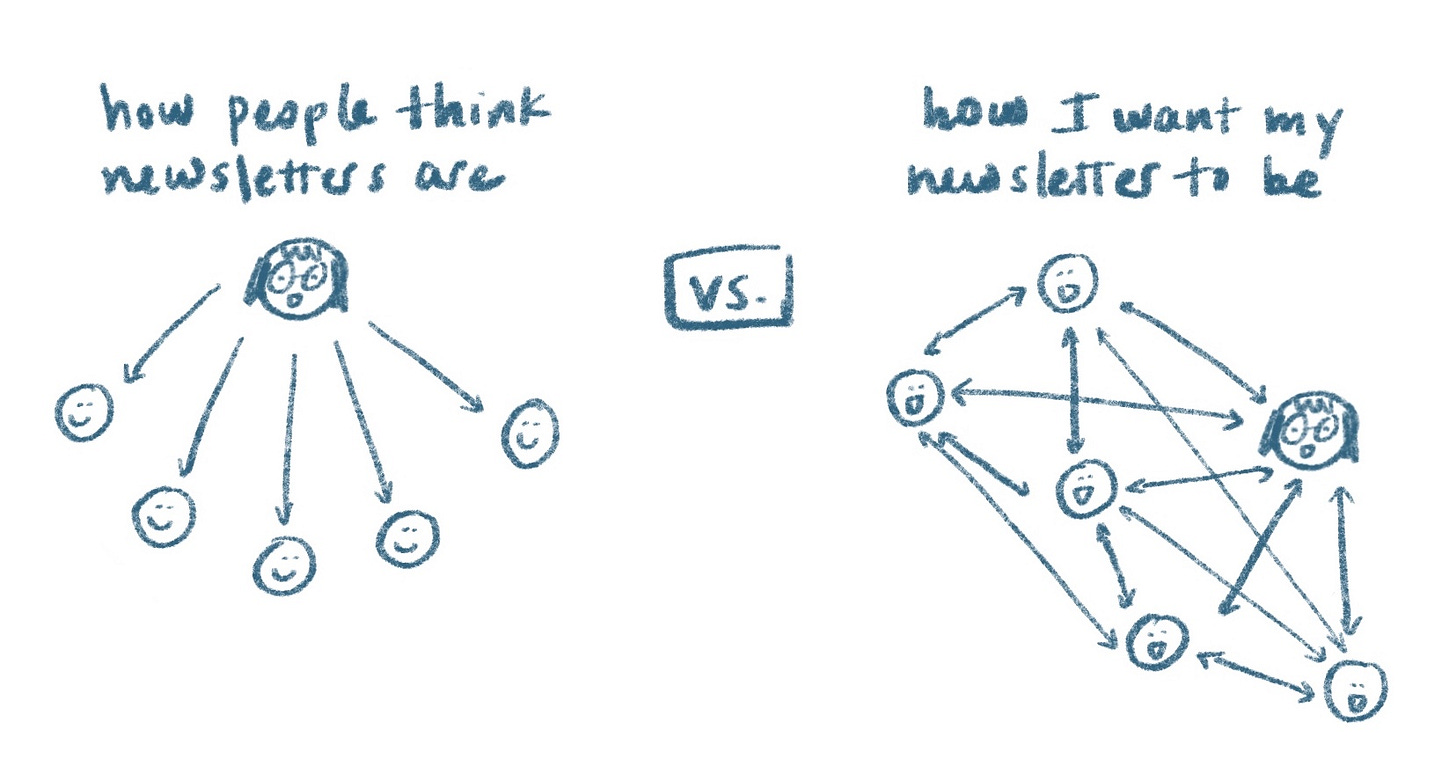20. newsletter as practice
thinking about zines & in-betweenness + celebrating 20 issues!
Hi there! 👋 I’m Ida, and this is tiny driver, a newsletter about research, pedagogy, culture and their intersections. Thank you for being here. Reply anytime, I love hearing from you.
Wow. Apparently, I've been writing tiny driver for 20 weeks now. It's a little surreal to think that I started this newsletter back in July, when I was first making my way to Chicago and everything was so much in flux. Now, we're already at Thanksgiving week, and I'm starting the work of re-tooling my winter quarter syllabi for remote learning. I am still baffled by time—particularly this year, as I'm sure everyone else also is.
I think that I want to take the opportunity of this nice round number to reflect a bit on this newsletter, the space it has given me, and what I hope for its future.
What I write.

Funnily enough, writing this newsletter has become one of the most consistent things in my life. In a time of so much uncertainty and fatigue, it always feels good to wake up on Sunday mornings and know exactly what I am doing. (Well, maybe not exactly what I am writing...but it comes eventually.)
On July 10th, I wrote this about why tiny driver came into existence:
I decided to start writing this newsletter as a way to process this transition, and how it changes the ways I think about my research, my pedagogy, and how I interact with the world around me. And I want you to talk back to me (if you’d like to, of course).
And I wrote this about what my goals were for the newsletter:
I want this to be an email that you are delighted to receive when you open your inbox. (As most of you currently subscribed are my actual friends, I hope that this will not be an issue.)
I want this to be a space of growth, both for me and for those willing to engage with me through this medium. I hope that this space will help me become a better thinker and writer in collaboration with others who are invested in the same futures, in the same movements forward.
As I look back on this first post, I am re-inspired by the goals and intentions that I had in starting this space. Especially when thinking about the second one. Since the start, I've wanted this newsletter to be a way of connecting with other folks who are invested in building better futures. I've been lucky enough to receive replies, both from people I know in real life and those who have found tiny driver through other internet venues. (No longer is this a space where those currently subscribed are all "my actual friends," and that's both delightful and intimidating!!) It's been wonderful seeing this community develop, as folks send me links & thoughts that align with what and how I'm thinking. In fact, it's always from those who reply privately to my emails that I learn the most. 🥰
One thing that has grown out of these intentions—and perhaps something that I didn't really anticipate going into it—is the idea that this newsletter is a way for me to practice. In being a space of growth, this newsletter has been a place of experimentation—in content, in form, in voice, in register. 🔬
So much of what I've written for the past five or six years has been overlaid with an academic voice. The way that I've written about what I'm invested in has been methodical, written and re-written, in a particular voice that must take into consideration the conventions of this particular writing style. Don't get me wrong, academic writing has given me a lot (citational practice, for instance, is something that I am greatly invested in because it allows me to honor those who have shaped my thinking). But there's something about it that also heightens the barrier to entry. And that's precisely what I'm hoping to break down.
As a result, this newsletter has been a way for me to practice. Practice writing in my conversational voice—one that (I hope) is warm and inviting, one that elicits genuine engagement and interest. Practice in finding things that I care about and trying to make them more accessible. Practice in consistency and accountability. Practice in creating personal connections with others through new (to me) modes of communication. Practice in putting my voice out there and overcoming the fear of being heard (and critiqued).
I am grateful to this space for allowing me to practice all these things. And I am grateful to all of you who have practiced alongside me for the past twenty letters.
Here's to the next twenty.
What I teach.

Next quarter, I'm teaching a course on "Transnational Asian/American Activism." I'm really excited about it, because we will not only be thinking about Asian American social movements in the United States, but also those of Asian migrants in the United States. That is to say, those individuals who may not be legal citizens of the United States, but who have some sort of relationship to it nonetheless (whether it be an imperial one or a cultural one).
For me, the easiest example to bring up in explaining this are Iranian and Taiwanese students during the 1960s and 1970s. These decade in the US were ones that saw cross-racial coalitions building between minoritized groups, like Black, Chicano and Asian Americans, who were advocating for equality and social change within the United States (here's a great book by Laura Pulido who talks about these movements in Los Angeles). Just as important in these domestic endeavors, though, was their anti-imperialist stance. They ended up working alongside foreign student sojourners like Iranians (in the US for schooling before they would return to their country) who were agitating for political change in their homeland and an end to the neocolonial relationship between the United States and their homeland. Although they were foreign students, these groups still had an important impact on the way that Third Worldism was organized in the United States and organized alongside their American counterparts to advocate for change.
What I'm most excited for, though, is their final project. Here's an excerpt from my syllabus:
The final project will put to use the terms, theories and major issues we have been learning about throughout the term. In groups of 1-3 people, students will create a digital zine that takes on an important issue in Asian American or Asian immigrant activism in the United States. The goal is to both create a resource that is accessible to folks outside of academia while still providing a nuanced understanding of the historical context and current action steps that can be taken for an issue.
I love zines. (If you remember, I released one this summer on Navigating Grad School as a Woman of Color.) Reading them have at different times given me a sense of belonging and practical information to have in my toolbox. They've connected me to communities I wouldn't have known about otherwise and inspired my own creativity. I am so excited for this class on so many different levels, but I am excited to see what students come up with and how this project might give them newfound connection to their own communities.
In preparation for this, I've been building a small curation of Asian diasporic & Asian American zines to send as reference to my students. In sourcing these zines, though, I came across a tumblr post on POC Zine Project that hit me so hard (even though it's from 2013!!). It's a reply to an anonymous question from an Armenian American:
This post gave me pause for two reasons. First, this question was very much where I was at one point in my life. Growing up, it was so difficult for me to figure out where I belonged in the community that I had around me, and I think that this question very much aligns with that sense of uncertainty and confusion. But, more importantly (and the second reason why my breath got caught), the answer to this question was one that articulated a view that moved beyond how solidarity and community may have been narrowly conceptualized by the asker. The answer is long, and I encourage you to read it through, but I wanted to mention a few parts here that really resonated with me:
I encourage you to - in the process of finding an Armenian-American group/s to feel affirmed by - consider the value of participating in a broad range of POC groups/events.
Solidarity in POC communities is critical to our liberation and to dismantling institutional racism. I am not going to tell you what this should look like for you, because that wouldn’t be appropriate.
Instead, I’m going to give you a few glimpses into my own process and hopefully that is helpful in some way:
Practicing Solidarity Strategies Every Day = Very Easy Way To Find - And Be Accepted By - MULTIPLE POC Communities
The post goes on to show how the writer—who identifies as Chicana—participates in solidarity movements outside of her own subject-position. She shows up for and stands in solidarity with other communities of color, particularly Black communities, and volunteered for the Asian American organization CAAAV during Hurricane Sandy.
I can guarantee you that if you are practicing solidarity strategies with POC groups of any background, and supporting their efforts, you will DEFINITELY feel accepted. It is rare for people to reject love and support.
This idea of cross-coalitional solidarity is one that has been so, so necessary to social movements of the twentieth century, and to see it being articulated like this in 2013 is affirming. While it is important to see, recognize and acknowledge difference in lived experiences between groups, I do not think that I would be where I am now if not for the support of friends who may not share the same subject-position as me, but who are nonetheless moving in the same direct and stand for the same values that I do. It is through our shared perspective that we are able to support, care and be present for one another. We amplify each others' voices, and in so doing, work toward a future in which all our voices are heard.
This is all to say that I wish I knew this post existed back in 2013. Despite this, I pass it along to you, hoping that it may help you in your journey too.
What I consume.
In the Bookshop:
Currently Reading: The Vanishing Half by Brit Bennett
On Deck: Brown Album by Porochista Khakpour
Item(s) of note.

The Zine Edition:
From Mimi Thi Nguyen (a scholar I greatly admire): Evolution of a Race Riot #1 (1997)
From MOONROOT: An Exploration of Asian Womyn's Bodies (2011)
From Brown and Proud X MOONROOT: On Confronting and Resisting Anti-Blackness in Ourselves & in Our Communities (2015)
From the Asian American Feminist Collective: Care in the time of Coronavirus (2020)
A pup-date.
Girlie is absolutely loving the video filter feature on Zoom. Here she is as Zoro:
As always, thanks so much for reading through, and I'll see you in the next one!
Warmly,
Ida




